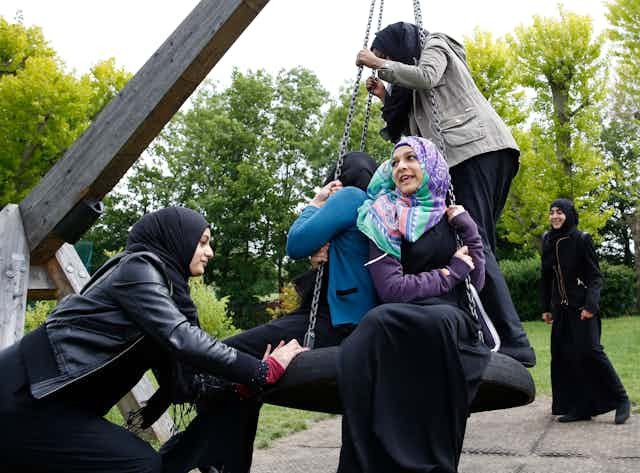The government’s “Prevent” counter-terrorism strategy is proving counter-productive, engulfing British Muslims further in the political rhetoric of the global “war on terror”. It has contributed to a growing moral panic between a British “us” and a Muslim “other”.
A hostile attitude towards Islam and Muslims and a tendency to associate Islam with intolerance and extremism, effectively asks British Muslims to decide whether they are Muslim or British by constructing these two facets of identity as incompatible.
My research has focused on Islam, identity and youth – complex, serious, and often misunderstood issues that, I’d argue, affect us all. I’m often asked what can be done about the radicalisation of our young people. I have no easy answers or solutions. But through my years of community work and interaction with young people, particularly third-generation Bangladeshis from east London, I can offer some insight on how it feels to be a young British Muslim in 2015, embroiled in a conundrum of non-belonging.
‘I am 100% British’

Teenagers I’ve talked to for my research have told me they feel they’re not considered “British” because of cultural and religious differences and the colour of their skin. Yet they’re dismissed by Bangladeshis as “tourists”, “Londonis” and “British” and view their parents’ or grandparents’ country as a place of “holiday” and not “home”. They feel they don’t fit in to British society, yet experience cultural and language barriers with their closest relatives at home.
As Taiba, a 17-year-old living in east London told me:
We would constantly hear things like ‘go back to your own country, you don’t belong here’. Where do we actually belong if we don’t belong here? Why can’t I be white? I used to ask my mum. I used to scrub myself hard. I used to ask my mum to bleach me.
Zeyba, 15, said: “They keep on telling me to go back to where I came from. I was born here. I am 100% British. Where is it exactly that I am supposed to go back to?”
Their stories are stories of identity crisis, dislocation, alienation, exclusion and upheaval. There are struggles with poverty, deprivation, disengagement, disconnection from language and culture, racism, Islamophobia, the complexity of “home” and the question of “Britishness”.
A new British-Islamic identity
At the same time, I’ve seen them create a new British-Islamic identity – a new Islam for a new generation. With its emphasis on banking, fashion, entertainment, travel, education – this new trendy and chic British-Islamic identity is highly modern, “western” and “British” in its outlook. The only difference is that many of these young people have a higher degree of spirituality and faith – and perhaps have more facial hair or wear the headscarf.
Many have fused together the many cultures that they are a part of – London, British, Bengali, Muslim – and have constructed their own unique identity as a solution to the identity conundrum of non-belonging.
But they are living inside a moral panic that has been constructed by the government and the tabloid press that depicts British Muslims as the un-British, violent, irrational and terrorist “other”. I’d argue that instead, British Islam is actually a peaceful, spiritual and very “British” community.
The problems with Prevent
Schools are one of the key sites of these tensions, particularly with the onus now on teachers to ensure they are teaching children “British values”. The coalition government introduced the Prevent strategy as part of counter-terrorism measures in 2011, but new legislation that came into force on July 1 formalised the strategy and gave the policy much greater prominence in English and Welsh schools.
Prevent remains problematic. Although the guidelines speak about tackling radicalisation and extremism in all communities, in practice there has been a disproportionately negative gaze and focus on the many Muslim communities across Britain – the vast majority of whom are hard-working, honest and law-abiding citizens.
This has been picked up by the National Union of Students whose “Students not Suspects” campaign is calling for a boycott of the government’s counter-radicalisation strategy. It argues that the policy will have a “chilling effect” on academic freedom, debate and free speech and also contribute further to a rise in Islamophobia and racial profiling of Muslim students.
The vast majority of people attracted to the ideology of terror, violence and murder suffer from deep social alienation and are psychologically disconnected from mainstream society. A study from the Hoover Institution at Stanford University suggests that among other complex motivations, righting perceived wrongs is a major terrorist motivation.
British documentary film-maker Rob Leach has pointed out that there are many complex reasons why young people, men in particular, are attracted towards Islamic extremism. Many experience deep-rooted ingrained factors of poverty, non-belonging or marginalisation and have a perceived sense of social injustice.
The government is asking teachers, social and youth workers, community leaders and other professionals to take responsibility with these complex and wider societal issues as part of the Prevent strategy. Instead, our already overworked teachers need to be left alone to do what they do best – inspire, engage, motivate, educate and above all, teach.

